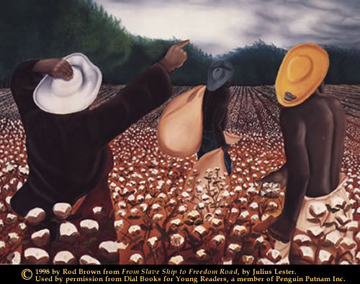
The Center for Black Studies Presents: LEGACY OF SLAVERY: UNEQUAL EXCHANGE
A COLLOQUIUM ON THE SOCIO-ECONOMIC LEGACY OF SLAVERY
OVERVIEW:
The legacy of slavery continues to shape the nation's politics in ways that are not fully appreciated by a citizenry who would rather ignore its history in the vain hope that they might escape it. The U.S. is not alone in its reluctance to come to grips with this heritage -- so are the rest of the American nations. Most people in the U.S. are only dimly aware that slavery penetrated the Americas from the U.S. and Mexico to Argentina. Nor do they appreciate its historical significance in shaping the modern world. From twelve to fifteen million Africans came to the New World from the fifteenth to the late nineteenth centuries -- the greatest forced migration in modem times if not in human history. In fact, until the European migrations of the early twentieth century, more Africans came to the Americas than Europeans. The vast majority landed in the Caribbean and Brazil, and for this reason the conference starts with an examination of bondage in the nations to the south. The system of forced African labor that developed from Barbados to Mexico was launched only after attempts to enslave Native Americans failed to produce the desired results. The next panels examine how slavery played a major role in shaping colonial and antebellum politics, economics, and society in the U.S. and beyond. Although a small percentage of the Diaspora slaves were brought to the thirteen colonies, they were a vital part of its economic life in the South and in Northern cities during colonial times; in the early nineteenth century, masters and slaves migrated into the new Southern states and western territories, thus increasing the political power of the proslavery faction. Indeed, until 1820, more Africans came to the U.S. than Europeans. Historians examine the literature on slavery, the institution during its founding, and its importance for the political and economic development of the colonies, the nation, and Great Britain. Because generally the number of female slaves was proportionally high in the U.S. compared to the Caribbean, the effects of the institution upon slave women, their life, and labor is the subject of another panel.
The slaves' fate and future were the special concern of the national government after the Twelfth Amendment emancipated them. As the government's commitment waned, Jim Southerners passed Jim Crow laws and Northerners accepted racial discrimination as normal not only in Dixie, but as the custom in states from New York to California. This nadir in race relations thwarted most African Americans' attempts to participate in the political process and to prosper economically. Panelists will discuss the national dimensions of racism and discrimination and their effects upon the larger world to reveal how the heritage of slavery shaped U.S. society well into the twentieth century and beyond.
In recent years these various injustices and the lingering effects of slavery itself motivated civil rights organizations and legislators to try to focus the nation's attention on the issue of reparations for the descendants of slaves. In California, SB 2199 and 1737 were passed to address these issues in 2000. The question of reparations are the subject of the last panel. The numerous precedents and the international dimensions of this controversial issue will be examined along with the specific U.S. ramifications. On the last day, the availability of web sites on slavery materials and the question of how to introduce this material into the schools will be addressed, to be followed by an open forum in which members of the audience and from the community can speak.